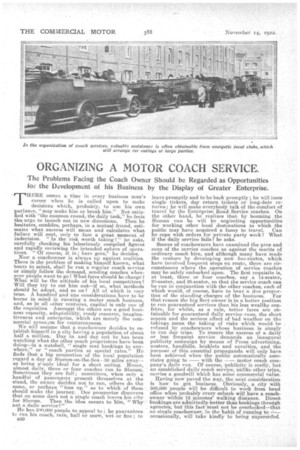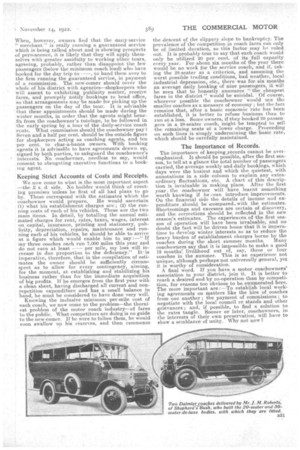ORGANIZING A MOTOR COACH SERVICE.
Page 14

Page 15

If you've noticed an error in this article please click here to report it so we can fix it.
The Problems Facing the Coach Owner Should be Regarded as Opportunities for the Development of his Business by the Display of Greater Enterprise.
HERE comes a time in every business man's career when he is called upon to make
decisions which, probably, to use his own parlance, "may make him or break him." Not satisfied with "the common round, the daily task," he. feels the4 urge to launch out in new directions.. Then he hesitates, confides, perhaps, in a mutual friend, estimates what success will mean and calculates what failure will cost, only to face a great moment of indecision. " Is the risk worth taking ? " he asks, carefully checking his laboriously compiled figures and rapidly reviewing the intended sphere of operations. ' Of course, it is ; here goes," he decides. Now a coachowner is always up against realities. There is the problem of making himself known, what tours to select, shall he run a regular coach service or simply follow the demand, .sending coaches wherever people want to go? What fares should he charge? What will be the attitude of his local competitors ? Will they try to cut him out—if so, what methods should he adopt, and so on ? All of .which is very true. A hundred and one considerations have to be borne in mind in running a motor coach business, and, as in' all other ventures, capital is only one of the requisites. Amongst the others are a good business capaoity, adaptability, ready resource, imaginativeness and enterprise, which are merely the cornmercia,I synonym for venturousness.
We will assume that a coachowner decides to establish himself in a city.haying a population of about half a million. Day in and day, out he has been watching what the other coach proprietors have been doing—in a nutshell, "single seat bookings to anywhere," or " coach parties at special rates." He finds that a big proportion of the local population regard a day at. Slocum-on-the-Sea---50 miles away— as being saiplv ideal for a short outing. Hence, almost daily, three or four coaches run to Slocum. Sometimes they are full ; sometimes, when only a handful of passengers present themselves at the stand, the owner decides not to run, others do the same, or perhaps "toss up " as to which of them should make the journey. Our prospector discovers that on some days not a single coach leaves his eitv for Slocum. Then the idea occurs to him, "Why
riot a daily service?" . He has 500,000 people to appeal to ; he guarantees to run his coach, rain, hail or snow, wet or fine ; to B30
leave promptly and to be back promptly ; he will issue single tickets, day return tickets or long-date returns; he will make everybody talk of the comfort of travel by the Enterprise Road Service coaches. On the other hand, he realizes that by booming the Slocum run he will be neglecting opportunities for working other local destinations to which the public may have acquired a fancy to travel. Can he cope with orders for private party work? What if the daily service fails? he asks. Scores of coachowners have examined the pros and cons of the service coaches as against the merits of ordinary coach hire, and although many have made the venture by developing new blts-routes, which have involved frequent stops en routes, there are circumstances where the operation of service coaches may be safely embarked upon. The first requisite is, at least, three or four coaches, say a 14-seater, 20-seater, and 28-seater, so that the service coach can be run in conjunction with the other coaches, each of which would, of course, have to bear a due proportion of the standing charges of the business. For that reason the bigfleet owner is in a better position to run guaranteed services than his less wealthy confrere, for whilst, as a rule, better fares are obtainable for guaranteed daily service runs, the short season and the serious effect of bad weather on the takings mean the taking of risks which would he refused by coachowners whose business is simply to run day trips. To ensure the success of a daily or less frequent service demands an inaugural publicity cornpaign by means of Press advertising, posters, handbills, booklets and novelties, and the purpose of this essential propaganda will only have been achieved when the public automatieally associates going to — with the -motor coach company's daily run. Of course, publicity is costly, hutan established daily coach Service; unlike other trips, carries a goodwill which has, some commercial value.
Having now paved the way, the next consideration is haw to get, business. Obviously, a city with 500,000 people will be difficult to work from head office when probably every suburb will have a coachowner within 15 minutes' walking distance. Direct bookings are admittedly better than bookings throngh agencies, but this fact must not 'be overlooked—that no single coaehownBr, in the habit of running to — occasionally, will take kindly to being superseded.
When, however, owners find that the daily-service " merchant " is really running a guaranteed service which is being talked about and is showing prospects of permanence, it is likely that they will apply themselves with greater assiduity to working Other tours, agreeing, probably, rather than disappoint the few passengers (below the minimum coach load) who have booked for the day trip to to hand them over to the firm running the guaranteed service, in payment of a commission. The new-corner should cover the whole of his district with agencies—shopkeepers who will assent to exhibiting publicity matter, receive fares, and promptly notify boOkings, to head office, so that arrangements may be made for picking up the passengers on the day of the tour. It is advisable that these appointments should be made during the winter months, in order that the agents might laenefit from the coachowner's tutelage, to be followed in • the early spring by a. tear of the daily-service 'coach route. What commission should the coachowner pay ? Seven and a half per cent. should. be the outside figure for shopkeepers acting as coaching agent, and ten per cent, to char-k-bancs owners. With booking agents it is advisable to have agreements drawn up, signed by both parties, to safeguard the coaehowner's interests. No coaehowner, needless to say, would consent to abrogating executive functions to a booking agent.
Keeping Strict Accounts of Costs and Receipts.
We -now come to what is the most important aspect —the X s. d.side. No builder would think of erecting premises unless he first of all had plans to go by. These correspond with the estimates which the coachowmar would prepare. He would ascertain (1) what his establishment charges are ; (2) the running costs of each of his vehicles. These are the two main items. In detail, by totalling the annual estimated charges for rent, rates, taxes, wages, intereston capital, insurance, printing and stationery, publicity, depreciation, repairs, maintenance and running each of his vehicles, he should be able to arrive at a figure which would enable him to say:—" If my three coaches each run 7,000 miles this year and do not earn at least — per mile, my loss will increase in due proportion to the deficiency." It-is imperative, therefore, that in the compilation of estimates the owner should be sufficiently circumspect as to allow for every contingency, aiming, for the moment, at establishing and stabilizing his business rather than for the immediate acquisition of big profits. If he emerges from the first year with a clean sheet, having discharged all current and nonrepetition expenditure and has a small balance in hand, he must be considered to have done very well.
Knowing the inclusive minimum per-mile cost of each coach, we now come to the problem—the thorniest problem of the motor coach industry—of fares to the public. What competitors are doing is no guide to the new-corner. If he were to follow them, he would soon swallow up his reserves, and then commence
the descent of the slippery slope to bankruptcy. The prevalence of the competition in coach fares can only be of limited duration, so this factor may he ruled out. It is probably true to say that each coach would only be utilized 20 per cent, of its full capacity every year. For about six months of the year there would be no work for the service coach, and if, taking the 28-seater as a criterion, and assuming the worst possible trading conditions, bad weather, local industrial depression, etc., there was forsix months an average daily booking of nine passengers, it will be seen that to honestly announce "the cheapest fares in the district " would be suicidal. Of course, wherever possible the coachowner would ur.e the smaller coaches as a measure of economy ; but the fact. remains thatl after a basic economic rate has been established, it is better to refuse business than to run at a loss. Some owners, if they booked '20 passengers in a 28-seater coach, might be tempted to sell the remaining seats at a lower charge. Proceeding on such lines is simply undermining the basic rate, which should be• carefully maintained.
The Importance of Records.
The importance of keeping,records cannot be overemphasized. It should be possible, after the first season, to tell at a glance the total number of passengers carried, the average weekly and daily bookings, which days were the busiest and which the quietest, with annotations in a side •column to explain any extraordinary fluctuations, etc. A chart of this description is invaluable in making plans. After the first year. the eoachowner will 'have learnt -something worth knowirq if he /can introduce improvements. On the financial side the details of income and expenditure should be icompareth with the estimates. Shortcomings and excesses are certain of discovery, and the corrections should be reflected in the new season's estimates. The experiences, of the first season of operation will have been invaluable, and no doubt the fact will be driven home that it is imperil,time to develop winter interests so as to reduce the heavy burden of establishrnent charges borne by the coaches during the short summer months. Many eoachowners say that it is impossible to make a good 12 months', livelihood out of, say, three or four coaches in the summer. This is an experience not unique, although perhaps not universally general, yet it is worthy of consideration. A final word. If you have a motor coachownera' association in your district, join it. It is better to reach a desired end by co-operation than by competition, for reasons too obvious to be enumerated here. The more important are :—To establish local working agreements on matters like the hire of coaches from one another ; the payment of commissions ; to negotiate with the local council re stands and other .grievances ; and, if possible, to find a solution to the rates tangle. Sooner or later, coaehowners, in the 'interests of their own preservation, will have to Show a semblance of unity. Why not now ?
































